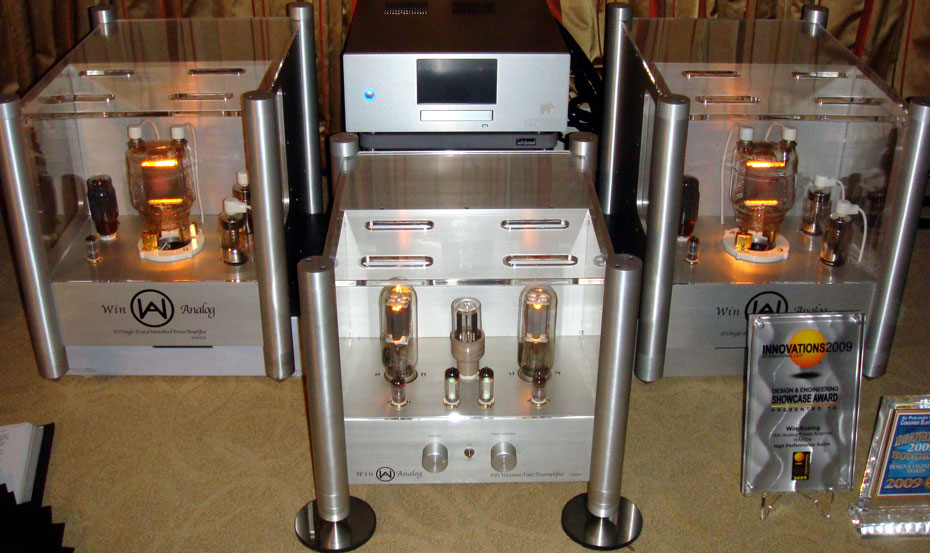
Win Analog at 2010 CES: LS845a linestage (center, $45,000), WA833a monoblocks (left and right, $75,000/pair). Stuff that people want now. Dagogo Review to come.
I recall seeing a reference to a survey in an audiophile magazine which indicated that the average audiophile spends approximately 10% of their income on audio related purchases. That caught my attention as I was already smitten by audio gear in my teens and had no income for equipment. I would listen to my father’s Heathkit stereo and accompanying large, full range furniture grade cabinet speakers. My first stereo, excepting the kiddy Emmerson receiver/turntable I wore out, was a Radio Shack Realistic receiver for $80, which took all of my money. I didn’t have enough to buy speakers, so I pulled two full range drivers (one was 10″ and the other 12″) from abandoned console stereos and used lamp cord as speaker cable. My first speakers were literally naked full range drivers! How’s that for LoFi audiophile equipment? When I see pictures online of systems with one or two nice components and the others budget pieces, or “racks” made of cinder blocks I can relate. My first stereo shelving unit was a microwave cart with its doors removed!
I would suggest that in the vast majority of cases the person who spends 10% of annual income on audio gear is “fiscally imbalanced.” When housing can consume 30-40% of income – I would question someone spending 40% of income on housing as well, but in certain geographical regions it’s a defensible expenditure – and altogether too many people are living on credit, should one spend 10% on a stereo? I think not. I would guess that such a survey would not represent the average person, but the enthusiast with skewed finances. Ten percent would be a big reason some wives get disgruntled about the hobby; they can often detect misallocation of resources.
My audio expenditures must fit into my budget after I have taken care of the important things such as charitable giving, savings and investments, household operations, and budgeting foreseen expenses. In other words, audio is not funded on the back of necessities. I relegate my audio expenditures to approx 2.5% of my annual income. I have never spent more than 5% of annual income on audio, the exception being the year that I built my listening room. Two times I sold off my entire system to persons entering the hobby and rebuilt it entirely. According to the survey I spend far less annually on it than many. However, I have regularly expended that amount for more than 20 years, so that with continuous upgrades I have experienced quite a variety of equipment and now have a reasonably respectable reference system.
Obtaining a quality rig does not take a huge budget, but it does take discipline, consistency and research. People fresh out of high school or college might see the system of a fifty or sixty year old person, then read a statistic about how much must be spent to “get there.” They are likely to think they will never get there. That was me twenty years ago, but I was driven by the desire to hear better sound. If one keeps with it, over time amazing goals can be achieved! (I shall bear that in mind in my continuous pestering you to write shorter reviews. –Ed.)
Making a comparison from the world of sports, many have gotten past the initial shock of the implausibility of running a marathon by breaking it down into a program of training sessions. So also many financial endeavors that appear outrageous can be accomplished with systematic effort. I recall the first time being enlightened to the costs associated with classic cars. It is nothing to put $20-30k into a restored vehicle, and in some cases much more. When I was in my twenties, it sounded preposterous to blow that much money on a car. Now that I’m pushing 50, with different financial circumstances, and having experienced how one can build toward such goals, it’s not inconceivable. I doubt I’ll ever own a classic car, but I can now see how, if I worked on a ten- to fifteen-year plan, I could do it without undue financial stress. The problem is most audiophiles want their dream audio system now.
I observe that a lot of people spend much on designer clothing, food and water, and other consumables which yields little lasting impact upon the soul. By tweaking their expenditures to include some decent audio equipment they could, for not too much money, enjoy an environment filled with the joy of good sound. As they age, they could ratchet up their total fiscal commitment to create an impressive audio experience.
My advice: Become a saver and investor as a means to support being an audiophile. Keep that priority and you will likely be able to pursue the hobby and your “ultimate rig” in such a manner as to yield enjoyment for a lifetime. The day will come when you become a big audio spender, but it will be in proportion to a well balanced budget.
- (Page 1 of 1)
